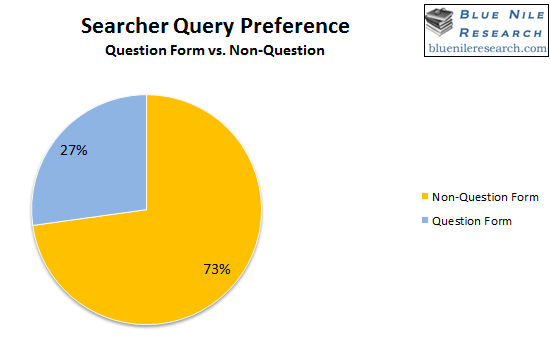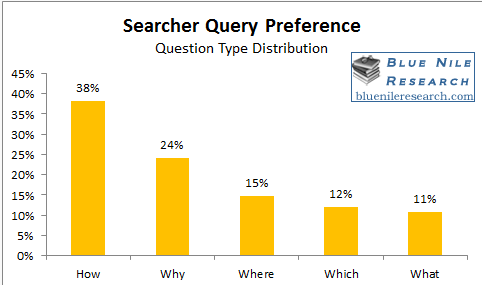From time to time I will be publishing “retro posts” from my old (and not often updated) Marketing Jive site.
In June 2015, I wrote an article around the topic of performing keyword analysis based on semantic intent. Here is a look at that post in it’s entirety.
Keyword Analysis Based on Semantic Intent
For years I’ve been interested in the idea of Semantic Search. As a user of Search I’ve always been one to type in full questions as part of my search queries. In fact my first favorite search engine used to be Ask or if we go way back Ask Jeeves. I’ve always like the concept of directly asking a question and receiving a direct answer. I’ve often said that ASK was ahead of their time when it came to search. I remember being at a Search Engine Strategies conference in San Jose years back and a gentleman by the name of Keith Hogan, who was then the VP of Search at ASK at the time, presented some material on how searchers were becoming more savvy and were typing longer term phrases as part of their search queries. His data suggested that 8+ word phrases saw the largest increase in volume based on data he shared from ASK. To me this totally made sense. People search because they are looking for answers. The search engines are the mechanism people use online to find their answers.
Case in point, in the summer of 2013 you have Google releasing Hummingbird with a shift in focus to more of a conversational search based in part on the shifting trend towards mobile search activity. It all makes sense; Search is morphing into an entirely different way to find relevant information. It is all about convenience and still about relevance… semantic relevance.
I came across this article from Nathan Safran of Blue Nile Research where he discusses some of their recent research that may change the way you conduct keyword research. This is something that I have been coaching our SEO teams on for a while now as we refine how we conduct truly effective keyword research.
The Difference between Traditional Keyword Research & Semantic Keyword Research
Historically, traditional keyword research used a combination of looking at a client’s site, their analytics and leveraging tools such as Google Keyword Planner, WordTracker, SEMrush, Ubbersuggest, Soovle etc to compile a list of keywords that the client would optimize for. Keywords would be placed on the page, in tags and other page elements and regardless of whether you admit to it a certain density formula was used to help optimize a given piece of content for a given key phrase or two, or three… and this process used to work.
However like many optimization tactics, some site owners and marketers abused this tactic and used keyword spamming techniques to try and game their search results. Google in their ever-long fight against webspam released updates to help combat keyword spam and the manipulation of their search results. The end result is that traditional keyword research has become less effective
A more modern approach to keyword research is Semantic Keyword Research. Semantic keyword research still involves components of traditional keyword research, but it takes a deeper dive into intent. It focuses on semantically relevant topics that are based more on conversation. As a result the need to become an authority for a given topic that is supported by multiple relevant terms becomes increasingly important. Semantic keyword research allows us to gain more insight into how people search for a given topic or a certain product or service.
One of the interesting findings from the Blue Nile Research study of Psychology of the Searcher: Patterns in How Searchers Formulate Queries is the idea of fragment queries (2-3 words) vs full queries (4+ words). The study suggested that there is roughly a 50/50 split in the type of queries that searchers use to find their information. This goes back to what I mentioned in the findings from ASK earlier in that there is a shifting trend toward longer phrase search queries. Ultimately this suggests that many users are typing in longer queries in order to get the specific answer that they are looking for. Perhaps this illustrates the difficulty in a search engine such as Google being able to consistently return the most relevant result. If you factor in that my semantic map when I search for a “tablet” is much different than what your semantic map is you see just how difficult it is for Google ro provide the most relevant result all of the time. I may search for “ipad” or “ipad reviews” or “Samsung tablet” or “when is the new iPad coming out?” Whereas you may be searching for “tablet magazine”, “tablet reviews”, “tablet simulator”, “what is the cheapest tablet out there?” etc. You can see two distinct searching or semantic patterns.
Semantic Keyword Research means that as marketers you need to leverage a strategy that includes understanding a varied and distinct way that your audience is searching for your brand, product or service. How many brands are guilty of using their own marketing lingo only to find that the vast majority do not know or care about this jargon? The Blue Nile Study showed that 27% of searchers phrased their query in the form of a question. This actually seems low to me as I would expect that the number of question related queries out there is closer to the 40% mark.

Source: Blue Nile Research
The study took it one step further breaking down the distribution of question type. According to their data, users searched for “how” the most often (38% of all questions) and “what” the least often 11% of questions. I was surprised to see “Where” in the middle at 15% of question types. If you think of the trend towards mobile search, searchers are looking for convenient and quick answers, “where is the nearest Tim Horton’s?” as an example. So I would expect that in the future we may see more searchers using the “where” query more often. The question of “How” will always be the most asked question type phrase on the Internet simply because people are seeking a solution to their problem/issue. People have a lot of questions: “How much is the new iPad”, “how do I reprogram my key fob”, “how do I make Greek style potatoes?”, “how much does a chiropractor make?”

It becomes easy to see that understanding semantic intent is
- Not easy and
- Critical to providing the right content at the right time to your audience.
If you look at some of the innovations form Google in recent years you can see how they have been leading up to better understanding user search intent . At the heart of what they do, Google is attempting to return the most relevant result in the quickest manner possible:
- 2004 Google launches Google Suggest
- 2007 Google launches Universal / Blended Search (although ASK had beaten them slightly with ASK’s Vertical Results which I blogged about here in 2006)
- 2009 Google pushes out Personalized Search
- 2010 Google launches Google Instant aka Search Suggest
- 2012 Google launches Knowledge Graph
- 2013: Google launches conversational search aka voice search
- 2013: Google releases Hummingbird (my Mediative post about Hummingbird)
Google has made great strides in understanding the intent behind a query. While still not perfected the “Google A.I.” is taking a closer step into becoming that Star Trek computer that they strive to become. The need to shift from traditional keyword research is upon us, in fact if you are just now paying attention to things like semantic search and entity search you are a bit behind. Your keyword selection process should be based around the intent of your audience. It may mean some extra effort from your part in understanding the search habits of your desired audience.
I’ll leave you with three tips for conducting semantically relevant keyword research:
- Understand the intent of your audience. Here are a couple of great sources for this:
- Review your internal site search – what questions are people asking?
- Use the Search Queries report in Google Search Console (formerly Google Webmaster Tools). What are some of the top questions being searched for?
- Monitor your audience on social media. This is where you can gain invaluable insight as to topics and terms that your audience is using to engage with your industry, your brand or your products/services.
- It’s not just about search volume. Long-tail keywords which are typically longer in length (such as a question based query) can deliver tremendous value even though they may have less search volume than more generic or branded terms.
Slapping a keyword within your page copy four or five times is simply not going to help your website gain visibility in organic search results. In some cases you do not even need the keyword to appear on the page to “rank” for it. Your focus should be on creating relevant themes for your audience and becoming an authority around these themes.